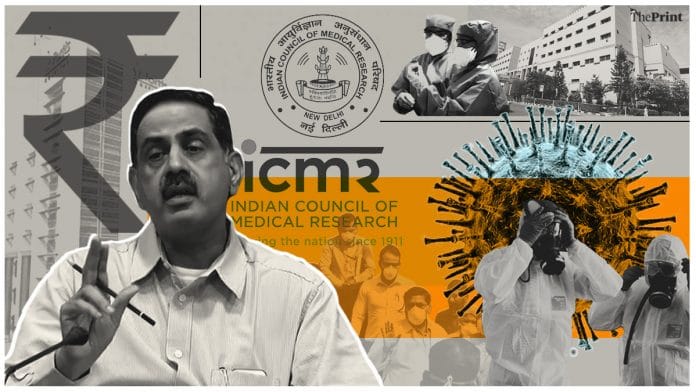The Narendra Modi government will allow accredited private labs to test for the novel coronavirus to increase India’s testing capacity. It has also asked private hospitals to keep beds ready and is in talks to negotiate the cost. India is currently at stage two of the pandemic. ICMR’s director-general has appealed to private laboratories to offer COVID-19 diagnosis for free.
ThePrint asks: Should India’s private healthcare join COVID-19 fight or risks becoming a profit venture?
During swine flu, India expanded facilities and fixed price rate for private labs. Need to do it again
 Dr Naresh Trehan
Dr Naresh Trehan
Chairman, CII National Council on Healthcare & Founder, Medanta
In view of the fact that we urgently need to know whether we’re entering stage three, there is no question on the need for the private sector and government sector to work together. The issue at hand is expanding the COVID-19 testing facilities. We have the capacity for testing in some of the big labs and they should be utilised.
There is a certain cost for the testing kit and the process and will burden the private labs too much.
Earlier, when the swine flu was on rise, the government had expanded the facilities and fixed the price for testing in private labs. It freed the capacity in government testing centres, which enabled them to test those people who could not afford testing at private centres. The same thing can be mirrored in the case of COVID-19 testing.
The government, along with the help of various health providers, can calculate a standard price. This will ensure that the private labs will not make any profit or lose any money. This should be considered a national service. The need to expand testing facilities looks quite urgent today. We need to learn from other countries, such as South Korea, that we’re able to contain it very quickly because they did rapid testing on a large-scale.
Incentivise private health sector in the fight against coronavirus, prevent profiteering during emergency
 Nitin Pai
Nitin Pai
Director, Takshashila Institution
There should be no doubt that a public health emergency like the coronavirus pandemic calls for a national response — where the resources of the government, private industry, civil society and the citizenry are all employed effectively. India’s response should be greater than the government’s response and it is incumbent on the national political leadership to bring this about.
As I argued last week, the private sector has substantial resources that can be inducted into the fight against COVID-19. From diagnostic testing facilities, to hospital care, to health care personnel — there is at least as much capacity in the private sector as there is within government. Given the risk that the pandemic will surge rapidly in the coming weeks, this capacity will be crucial.
The best way to do this is to ensure that private healthcare facilities have the incentive to give their best, while guarding against profiteering during the emergency. It is important to note that profit is not a bad word, but profiteering is. We need the private health sector to be healthy if we are to succeed in the fight against coronavirus.
Requiring labs and hospitals to declare their MRPs upfront strikes this balance. If this fails, then time-limited price caps are an option. While I am generally sceptical of subsidies, there is now a case for the government to reimburse the labs the costs of testing, so that as many people can get themselves tested. Each person who gets a test done helps the whole community.
Profiteering not a problem per se. Govt can set a standard COVID-19 testing rate for private sector
 Shailaja Chandra
Shailaja Chandra
Former secretary, Ministry of Health & Family Welfare
At this time, the involvement of the private sector is not only necessary but absolutely essential. The private sector has the capacity to do much more than the public sector in this situation. We need to have quick testing and results. There will be overcrowding of people who might need the COVID-19 test and so, there’s a need to have a clear understanding of who is responsible for undertaking tests for which area. We need to link private facilities by location and capacity, and have a protocol on the radius of populations to be served and how patients should approach these private centres to avoid overcrowding and confusion. Only with private sector support can the testing be increased exponentially. Election data can be used to map populations. The government already has the data on licensed private labs.
Profiteering per se is not a big problem. The government can have a standard rate and direct the private sector to only charge the agreed amount. Some proportion — say 25 per cent — can be reimbursed by the concerned state government. Those who can’t pay can go to a recognised government facility. The person should have a choice.
Testing needs to be widened to every single district and township because coronavirus is no longer restricted to urban areas like Delhi or Mumbai. Randomised samples of large groups, which represent a cross-section of public, need to be organised and inter-district comparisons drawn daily using the IDSP. Testing of coronavirus suspects and randomised testing are completely different and both are needed.
10 yrs ago, India won polio battle with private sector’s help. But against COVID-19, govt is dragging its feet
 Amir Ullah Khan
Amir Ullah Khan
Professor of Health Economics at Manipal Institute of Technology
The Indian state won its last battle against a virus named polio by fighting it with allies in the private sector and civil society. This was after the Global Polio Eradication Initiative had declared India the most dangerous and difficult terrain in its fight against the wild poliovirus. But this time, the state is dragging its feet on including the private sector and simply refusing to partner with civil society, which is frustrating to say the least.
Four out of five health care seekers first go to the private sector, which has been the case with most patients who tested positive for COVID-19 in India. With a bare minimum of testing capacity in the government sector (ICMR has only 52), there is a worldwide criticism of India’s inability to conduct tests.
With only five in a million being tested, the danger of large numbers of positive people innocently spreading infection is very high. Accredited private labs will charge a fee that the government can reimburse, and the numbers tested could go up to at least 30 in a million.
South Korea managed to cut off its fast growing curve in no time, thanks mostly to the fact that it tested around 4,800 people per million, like Bahrain did. South Korea spared no expense, and immediately involved the private sector. Why are we even thinking twice on replicating this, urgently?
Private health sector should be reimbursed by govt, testing decentralised to fight COVID-19
Dr Radha Rangarajan
Chief Scientific Officer, HealthCubed
The large majority of India’s healthcare needs are met by the private sector. This includes diagnostic services and patient care. We are currently facing an unprecedented public health crisis that can be averted if we abide by the WHO’s guidance to test as extensively as possible.
It makes sense, therefore, to actively seek the participation of private diagnostic laboratories and hospitals. Going one step further, one should even consider decentralising testing, like South Korea did, delivering services to people outside of laboratories. Primary care technology companies that are already working with communities can help test as well as monitor patients, so that early isolation becomes feasible. In addition, the private sector can participate in ongoing R&D efforts to improve tests, identify biomarkers and develop new treatment paradigms. Working together with the government, any new technologies or products that can address the unmet needs should be allowed expedited regulatory approval.
Overall, a collaborative approach between the public and private health sectors will be beneficial to the public. Of course, a mechanism for the private sector to be reimbursed will have to be worked out so that the patient is not unduly burdened.
Also read: ‘Rebel’ judge to Rajya Sabha: Ex-CJI Ranjan Gogoi hurting SC image or being harshly judged?
By Unnati Sharma, journalist at ThePrint







PM Kejriwal will provide free testing and treatment for corona virus illness for all. Jai socialism.
Definitely the private sector’s large capacity and resources should be used. But we all also know how the many large known institutions in the private sector literally fleece patients on their death beds. The govt should strictly warn the private sector that any profiteering or their usual bad practices will lead to their directors being fined / sent behind bars. In any case in this emergency the govt should just Sequestrate the private sector capacity and use. It for this pandemic!
The private sector should be fully involved in this national endeavour. Also have a sense of social responsibility, not seek to make unconscionable profits at a time of distress and suffering.
??? Apke ke comments padh kar angrezi shabd ‘ideal’ aur Hindi shabd ‘adarsh’ ka matlab samajh mein aata hai. Aap ek adarsh purush hain. ?